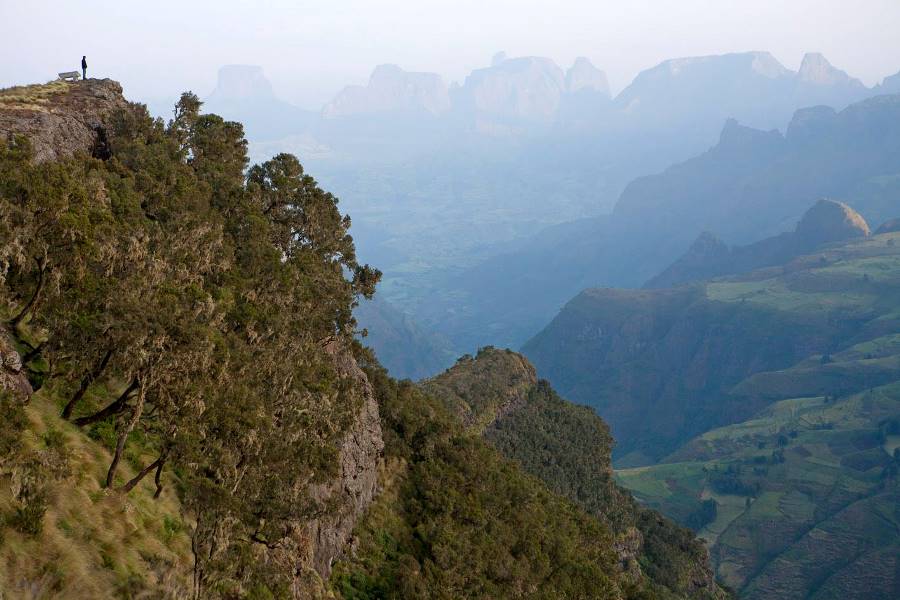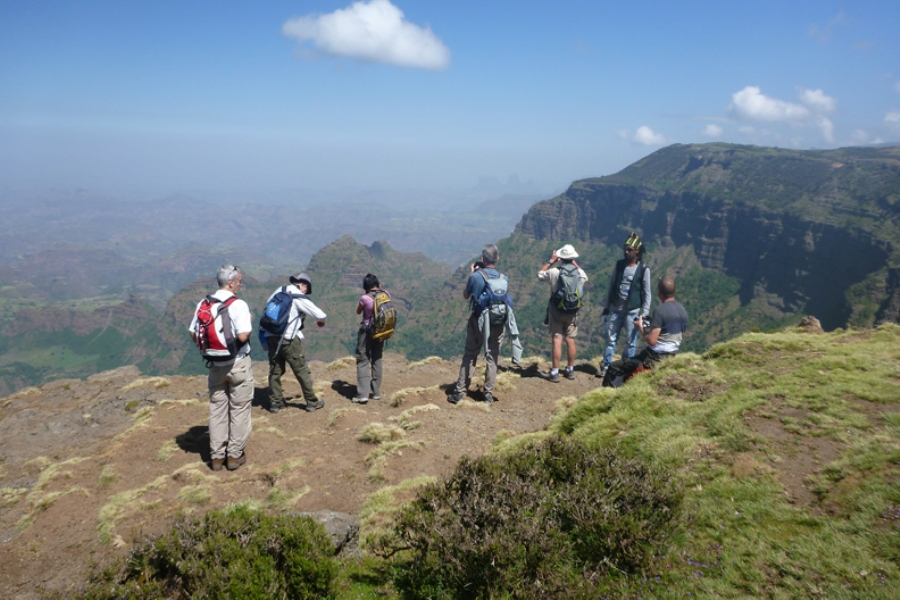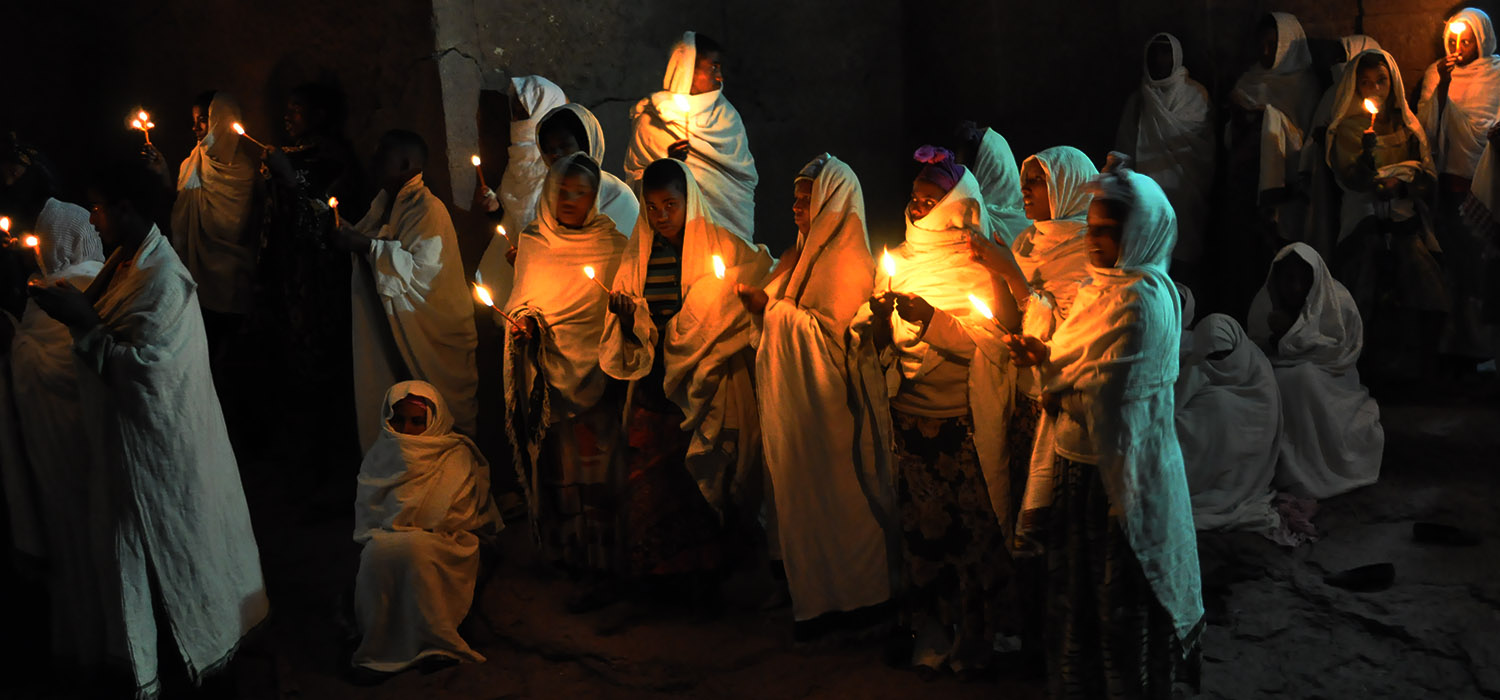Bird Watching Tours:
Package Details
Day 01:
Ghion hotel collections include Ruppell’s and Hooded Vultures, and the Peculiar
endemic Thick-billed Ravens, plus such less obtrusive species as Brown -rumped
Seed eaters, Grey-headed Sparrows, Baglafecht’s Weavers, Abyssinian Slaty and
Dusky Flycatchers, Africa Rock Martins, Tacazze Sunbirds, Red-eyed and Dusky
Turtle Doves, and endemic Wattled Ibises and White -collared pigeons.
Day 02: Excursion
to the DebreLibanos,
drive on to the Gorge -carved deeply by a tributary of
the Blue Nile- explore the forested escarpment above the monastery of
DebreLibanos, where you will look for the endemic Ruppell’s chat, then walk
along the lip of the gorge (a good Spot for a picnic with a spectacular view)
where Lammergeiers, Ruppell’s Griffons, Lanner Falcons, Fan-tailledRavens,
Black Kites, and the endemic White-billed starling Soar. Lower down, on the
lookout for the splendid Gelada Baboon, found in no other part of the world,
and the endemic White-Winged Clift Chat.
Day 03: Drive
slowly to the Awash
National park, Augur Buzzards, Long-crested Eagles, Carmine
Bee-eaters, Abyssinian and Rufous-crowned Rollers, Ostriches, Buff-crested,
White-billed Kori, and even Arabian Bustards, Lichtenstein’s and
Chestnut-billed Sand grouse, Rosy-patched and other Shrikes, plus many species
of hornbills, Weavers, Woodpeckers Vultures, doves, Pigeons, guinea fowl,
glossy starlings, parrots, bee-eaters, barbets, mouse birds and finches, and
the endemic Yellow throated seed eater, are to name but a few.
Day 04: Full
day birding around Bilen, over 440 species of bird have been recorded
in the Bilen area including rare species such as Yellow Throated Serin, Sombre
Chat and Arabian Bustard.
Day 05: Head down to the lake shores of Ziway and
then to Langano where
huge numbers of water birds are congregated. African Pygmy Gees, Yellow –
billed and marabou Storks, Lesser and Greater Jacanas, African Jacanas White
Pelicans, Fish Eagles, Crowned and Common Cranes are some of the species to be
seen here in impressive numbers.
Day 06: After
breakfast visit Lake Abiata and Shalla, it is an
enormous lake with enormous numbers of birds. Spend the morning enjoying this
spectacle of color, and looking carefully amongst the flamingoes, pelicans,
cormorants, storks, herons and waders for unusual vagrants in the distance, to
the east and west, loom the great walls of the Rift valley. Then drive back to
Langano.
Day 07: Drive
to the Bale
Mountains National park, look for the endemic birds such as
Abyssinian Long-eared owl, White-backed black Tit, Abyssinian catbird,
Black-winged Lovebird, Golden-backed woodpecker and, if very fortunate, maybe
even Black-headed Siskin. And amongst an interesting collection of upland birds
you are likely to see eleven of Ethiopians 29 endemics: Blue winged Goose,
Rouget’s Rail, Spot-breasted plover, white -collared pigeon, Black-winged
Lovebird, Golden-backed woodpecker, Abyssinian Long claw, Abyssinian Catbird, White-backed
Tit, Black-headed Siskin and Thick-billed Raven.
Day 08: Full
day with picnic lunch on the 4000 as Sanetti Plateau, with its
striking Afro-Alpine flora, such as the Giant Lobelia and Red Hot Poker. It is
the best place in Ethiopia to see the Simien Wolf, the rarest canid in the
world, while the huge rodent population, including the endemic Giant Mole Rat,
supports a variety of raptors. The rare Wattled Crane is often seen, while
there are a good number of the Spot-breasted Plover. TulluDimtu at 4377 m is
the second highest mountain in Ethiopia and we can drive all the way to the top
Day 09: We
set off back to the Lakes region, via Dinsho and arrive
at Wondo
Genet mid afternoon. Wondo Genet is a hot spring resort
(there is a naturally heated open air pool) set among forested hills. The
springs are said to have curative properties and the Emperor Haile Selassie had
a lodge here, now part of the hotel. In the gardens of the hotel we will see
the Silvery-cheeked Hornbill, White-cheeked Turaco, and Yellow-fronted Parrot.
Before dinner we will explore the juniper forests behind the hotel, where we
can see the Black-headed Forest Oriole, the Golden-backed Woodpecker, Redwing
Starling, Grosbeak Weaver, Mountain Wagtail and Black-roughwing Swallow. We will
also see Colobus monkey, Anubis baboon and bushbuck.
Day 10: Drive
to Awassa.
Amongst the lilies and great reed beds that encompass the lake you will
find Black, Goliath and other herons, the ugly Marabou Stork, Hamerkops, Hadada
Ibis, a variety of egrets, dainty Pygmy Geese, Fulvous and white-faced
Whistling Duck, Knob-billed Duck, Black Crakes, African Jacans, Three-banded
plovers Whiskered and white-winged Black Terns and Kingfishers, pied and
Malachite, Grey-headed and Woodland Kingfishers, Red-breasted Wrynecks, Green
Wood-hoopoes, Sulphur-breasted Bush Shrinkes, White-browed Robin chats, African
Thrushes, Rufous Chatters, Swamp Warblers, Red-faced Crombeces, Wattle-eyes,
Puffbacks, Spoted Creepers, and many other colorful species.
Day 11: Awassa –Addis
Ababa via Lake
Ziway
Take a morning lakeside walk to visit the Sidamo
fisherman as they land their catches of Tilapia and catfish, and gut and fillet
them by the lake. Here the air is alive with birds, their relationship with
these fishermen being entirely harmonious. Then return back to Addis
Ababa for the overnight stay.
Day
12: Back to Addis Ababa
& Departure
FOR A DETAILED PROGRAM OR FOR TAILORED MADE TOUR PLEASE CONTACT US.




